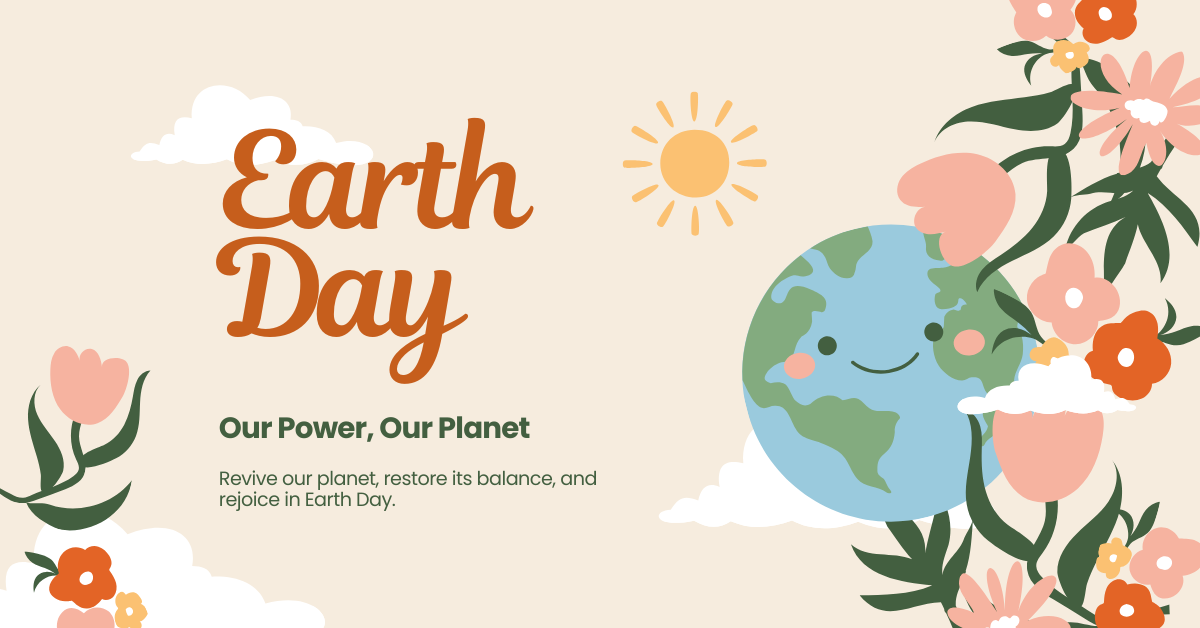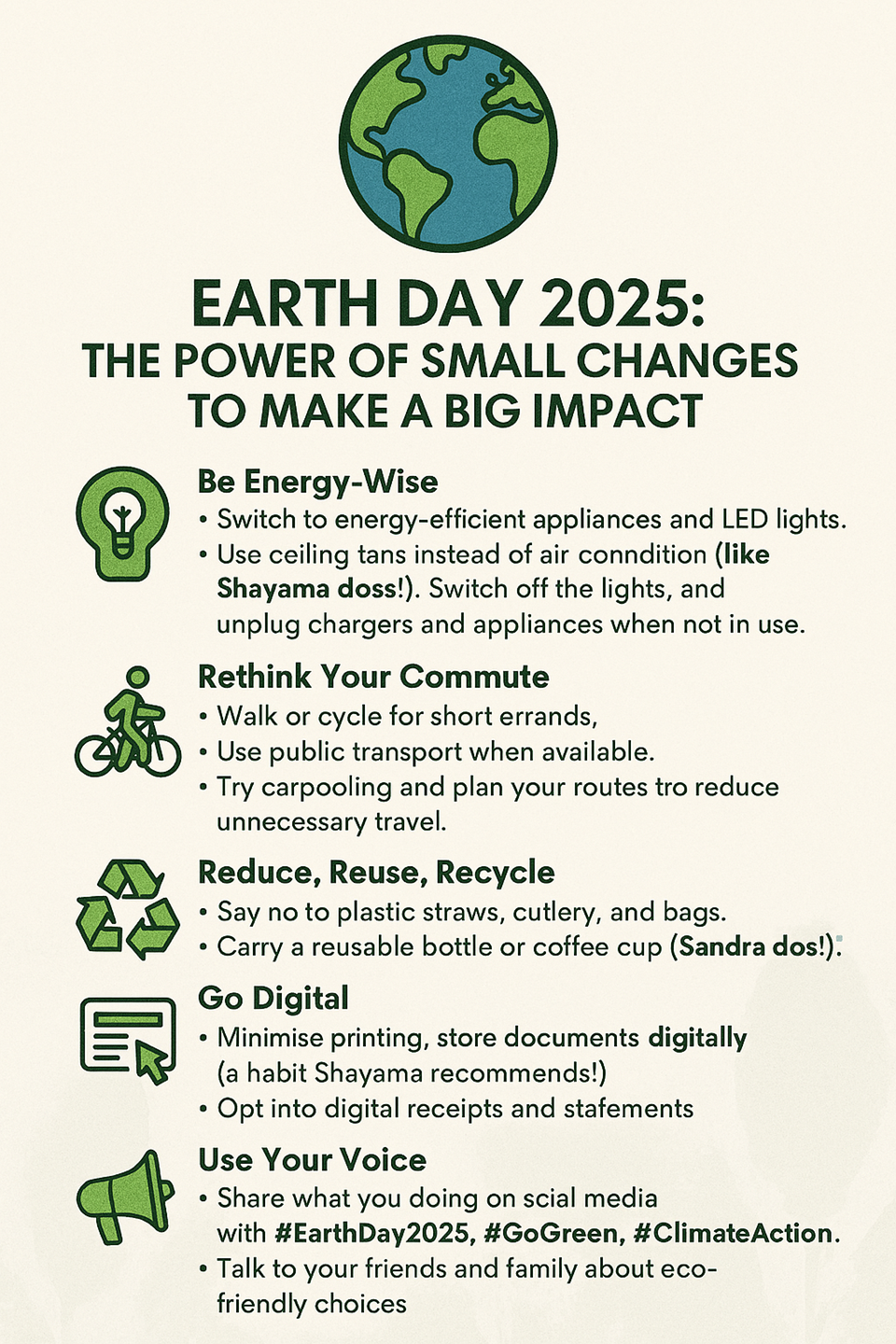
Earth is our home and the only one we will ever have. That reason alone makes April 22 especially significant. This is because April 22 is Earth Day, the day we unite in responsibility for our home. If you’re thinking that Earth Day is just another global movement, let 2025’s theme, “Our Power, Our Planet,” be a reminder that we hold the answer to environmental challenges. Issues like pollution, climate change, loss of biodiversity aren’t distant or abstract concerns but real problems that directly impact our health, food systems, economies, and, more importantly, the world we leave behind for our future generations.
Earth Day 2025 calls for education, advocacy, and mobilization toward “tripling the global generation of clean electricity by 2030.” The theme, "Our Power, Our Planet," is a statement of responsibility and empowerment, reminding us that we hold the power to shape a more sustainable future. Beyond global movements and international policies, simply by rethinking small actions — such as what we buy, how we recycle, and how we choose to invest our time and efforts, we exercise our power to protect our planet. How are you exercising your power?
Making Earth Day Work
To effectively promote environmental protection, Geller (1995) emphasized the importance of motivating people to “actively care,” that means to engage in altruistic, environmentally protective behaviors. For that to happen, a combination of personal traits, such as self-esteem, a sense of belonging, and optimism, alongside community-level interventions that apply proven behaviour-change strategies, is needed. In short, personal motivation and social support must work hand-in-hand to drive large-scale, sustainable action. Earth Day, as a global movement, offers a powerful platform for raising awareness and rallying communities toward meaningful, lasting change.
However, interventions alone aren’t enough; how these interventions are implemented makes a difference. In their review of solid waste recovery strategies, Porter et al. (1995) found that both antecedent approaches (like prompts) and consequence-based techniques (such as feedback) were effective in encouraging recycling. However, most interventions struggled to maintain their impact once the prompts or feedback were removed. Similarly, Kim et al. (2005) studied recycling behaviour at a South Korean university and found that publicly posted written feedback significantly improved recycling performance. But when feedback was withdrawn, most improvements declined.
It may be just a simple prompt or feedback, but these findings underscore a crucial point: for behavior change to last, visibility and consistency is key. This is exactly where Earth Day comes in. By keeping environmental issues in the public eye, whether through global campaigning or ground-up advocacy, it helps to serve as a reminder, spark new habits, and sustain long-term action.
We Are More Connected to Earth Than We Think
We spoke with two regional colleagues—Shayama Nafik, Sales Operations Senior Manager, APAC (Singapore), and Sandra Lim, Book Sales Manager (Malaysia)—who are both passionate advocates for protecting our environment. We asked them what this year’s theme means to them and how they incorporate its message into their daily lives.
For Shayama, "our well-being is closely tied to the health of our environment." She sees this year’s theme as a reminder to take care of both people and the planet: “It’s about supporting one another while taking responsible actions to ensure a sustainable future for the next generations.”
Sandra echoes this sense of deep interconnection. To her, the theme is a call to prioritize sustainable action and to preserve Earth’s resources so that we can safeguard the well-being of humanity and the natural world.
Their reflections align with the research by Majumder et al. (2022), which found that egoistic, altruistic, and biospheric values positively influence pro-environmental attitudes. These are what drive consumers’ intentions to sort waste, buy green products, and engage in social environmental activities. Much like how they have inspired our regional colleagues to turn those values into everyday action.
Small Actions, Big Impact
When it comes to environmental sustainability, the phrase "every little bit counts" isn’t a cliché, it’s science! Small repeated actions, especially performed at a community level, can lead to meaningful, long-term changes.
Shayama believes that protecting the environment starts with simple, consistent actions. To reduce her environmental footprint, she cuts down on single-use plastics by using reusable bags and containers, and minimizes food waste at home. She opts for energy-efficient appliances like LED lights and uses ceiling fans instead of air conditioning. In her day-to-day duties, she files documents digitally instead of printing them and brings a reusable coffee cup and water bottle to work. When it comes to running errands, she walks whenever possible, not only clocking in her steps, but also making sustainability a natural part of her lifestyle.
Since 2021, Sandra has adopted a minimalist lifestyle. She buys only what she needs, prioritising durable items to reduce frequent replacements. When it comes to buying consumables, she chooses refillable packaging whenever possible. She also champions the 3Rs—Reduce, Reuse, Recycle—by using energy-saving appliances, choosing renewable products, and minimizing waste. Beyond her personal efforts, Sandra actively participates in community initiatives and advocates for environmental policies that support long-term change.
Together, their approaches show that sustainability doesn’t have to be inconvenient or complicated. Often, it’s simply about being intentional in the choices we make every day.
So, What Can You Do?
You don’t need a big lifestyle overhaul, just a few practical ways to activate your "power" this Earth Day:

Our Power, Our Planet, Our Future
Earth Day 2025 reminds us that the power lies in our hands, and so does the responsibility. The future of our planet rests in every choice we make, every habit we form, and every conversation we start. By recognising our deep connection to Earth and to one another, we can turn awareness into meaningful action and contribute to the collective momentum for lasting change. This Earth Day 2025, let’s act with intention, not just to protect the planet but to shape a future where both humanity and nature can thrive.


.png?sfvrsn=8b16db93_1)


